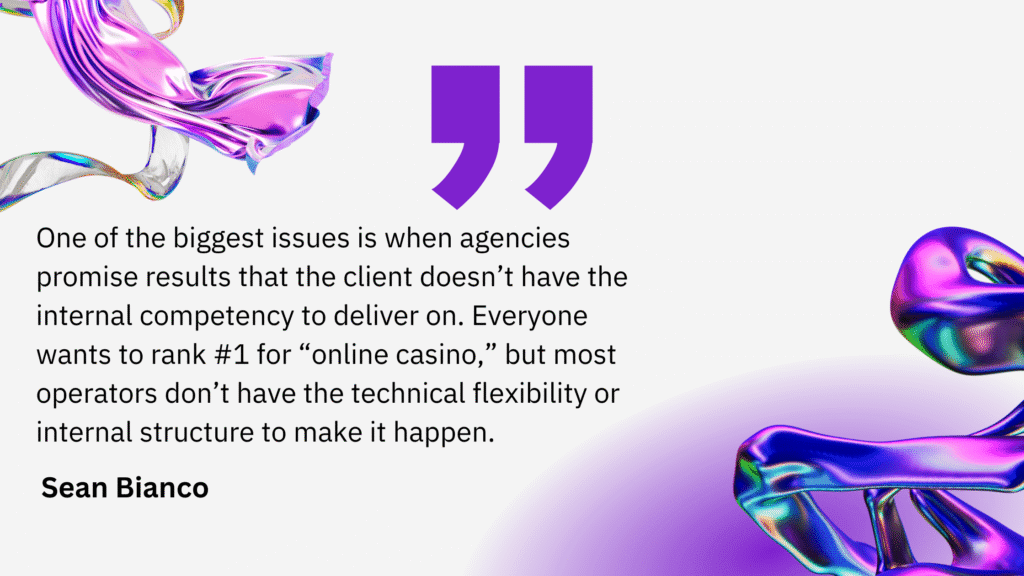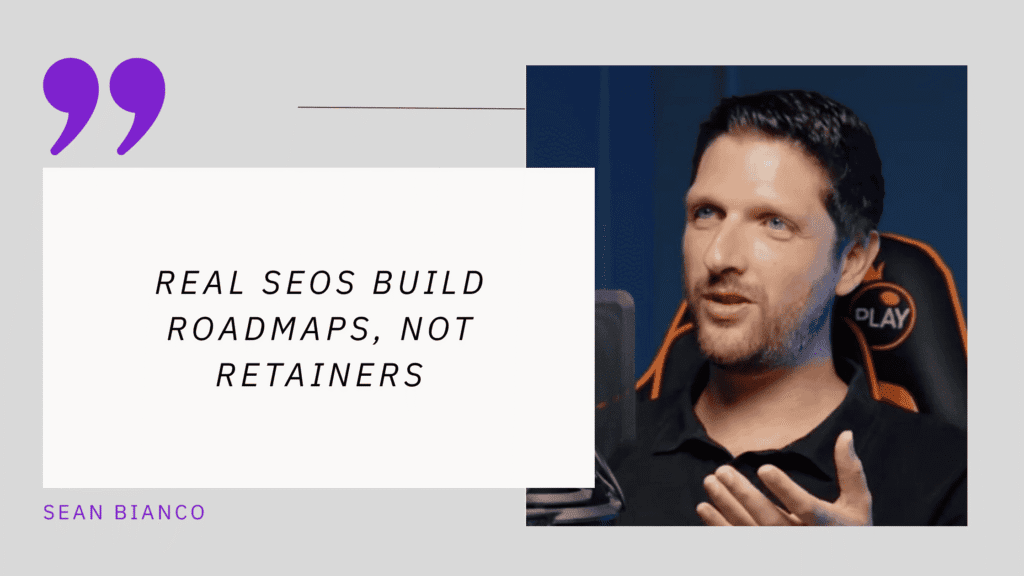About Sean Bianco
Sean Bianco, co-founder of Gain Changer, is an SEO expert with more than ten years of experience. He has built his expertise in some of the most competitive digital landscapes, with a particular focus on iGaming SEO. Having worked both in-house and agency-side, Sean brings a rare, balanced perspective on what truly drives results in one of the toughest verticals online. His career has spanned managing SEO strategies for operators, affiliates, and agencies alike, giving him first-hand insights into the recurring pitfalls agencies face when handling iGaming clients — and the strategies that actually move the needle.
Beyond his consulting work, Sean is a frequent contributor to SEO panels and discussions, known for his practical, no-nonsense advice. He has built a reputation for cutting through the hype and sharing strategies that balance compliance, innovation, and measurable ROI.
Interview – Lessons from Managing iGaming Clients — Common Pitfalls, Agency Mistakes, and Strategies that Actually Deliver Results
Casino SEO is among the most competitive and unforgiving digital landscapes. Mistakes are costly, quick wins often come with hidden risks, and Google updates can wipe out months of work overnight. Agencies play a central role in this industry, yet many repeat the same errors — from mismanaging content strategies to underestimating the importance of technical foundations.
In this expert interview, Sean Bianco draws on his years of experience managing SEO campaigns for gambling operators and affiliates. He reveals the common pitfalls agencies face, what they tend to get right, and how clients can separate the noise from genuine expertise.
Q: Sean, you’ve worked on both the agency and client side. From your perspective, what are the most common mistakes agencies make when handling casino SEO projects?
A: The SEO space in iGaming is highly competitive — and honestly, it’s the birthplace of many of the most innovative and aggressive tactics in SEO. This is where strategies are stress-tested in the harshest conditions.
The biggest mistake agencies make is treating iGaming like any other vertical. You can’t apply eCommerce frameworks to a gambling brand and expect to survive. There’s also a huge competency requirement — especially in learning how to defend against attacks. Negative SEO, spam injections, and link-level warfare are not hypothetical here; they’re large-scale, frequent, and commonplace.
Many agencies still rely on SEO tools and surface-level audits while being oblivious to the actual battlefield that’s happening in the SERPs. Without that awareness, their clients are exposed from day one.

Q: Casino SEO is notoriously competitive and high-cost. Where do you think agencies often overpromise — and what should clients realistically expect?
A: One of the biggest issues is when agencies promise results that the client doesn’t have the internal competency to deliver on. Everyone wants to rank #1 for “online casino,” but most operators don’t have the technical flexibility or internal structure to make it happen. Misalignment on objectives and expectations is where most SEO campaigns fail before they even start. To be frank, there’s also a lack of true expertise in the space. At GainChanger, we own and operate several iGaming affiliate sites successfully and profitably. We take what we learn from our own assets — what works, what fails, what survives updates — and use those insights as leverage for our clients. Most agencies can’t do that.
Unfortunately, most SEO agencies are sales-first, fulfilment-second. They white-label other people’s services, repackage reports, and call it strategy. Great pitches, terrible delivery.
Q: On the flip side, what do the best agencies consistently get right when it comes to iGaming SEO?
A: The best agencies aren’t trapped in a single project or mindset. When you work on only one site, you develop blind spots and fall into repeatable cycles that don’t adapt or grow.
Great agencies are constantly testing on their own assets and using those learnings to push boundaries for clients. At GainChanger, we dominate regulated iGaming SEO in several markets with key partners, operate our own affiliate sites profitably, and work across SaaS, eCommerce, and Local SEO.
That cross-pollination is powerful — it exposes us to tactics and systems most SEOs wouldn’t even consider. Not because they lack skill, but because they lack exposure.
Q: Content is often next to links at the center of Casino SEO. Where do agencies tend to go wrong in their content strategies — and what does “good content” look like in this niche?
A: Most agencies create “SEO filler” — keyword-heavy articles with zero authority.
But here’s the nuance: good content is subjective. I’ve seen one-page casino sites outrank fully fleshed-out, beautifully written platforms. Why? Because content alone isn’t enough anymore. The real trick is combining content with trust signals and authority.
That means brand presence, entity mapping, and link validation. Content is the shell — authority is the engine.
Q: Link building in iGaming is both expensive and risky. How should agencies approach it responsibly, and what mistakes do you see repeated most often?
A: Most people fundamentally don’t understand how authority works. They follow outdated link-building checklists from years ago and never adapt.
The main reason? Most SEOs only control one asset, so they’re overly cautious. They don’t have test environments to safely trigger link penalties or measure recovery strategies. At GainChanger, we deliberately build and test on experimental domains to find out what actually works — not what people say works.
Without that layer of testing, you’re simply following the herd consensus of “what’s safe.” That consensus inflates link prices and gives webmasters leverage, not SEOs. Ironically, the same people who swear they’d never use a PBN are buying links from PBNs without realizing it.
It’s not the tactic that’s risky — it’s the lack of exposure and testing that makes it risky.
Q: What is, in your opinion, a good backlink for a casino niche? What are the metrics and characteristics that are the most relevant?
A: A good backlink sends trust and topical relevance, not just DR. I look for:
- Relevance to gambling, finance, or sports
- Organic traffic and indexation
- Clean link profile and history
- Editorial context (not sidebar or footer)
But here’s the deeper truth: these are typical guidelines — and they’re often wrong in certain markets.
Most of the backlinks that actually move the needle in iGaming don’t even appear on third-party tools like Ahrefs or Semrush. That’s why campaigns built on tool-based metrics fail — they’re playing on the visible layer of the web, while the real data lives beneath the surface.
If your SEO decisions are made only from what you can see, you’re already behind.
Q: Technical SEO for casinos can be complex with multiple jurisdictions, regulations, and language versions. What agency errors do you see most in this area?
A: Funnily enough, I’ve seen operators blocking critical pages in their robots.txt so often it’s become an inside joke on our team. The root cause is that casino operators prioritize player experience over search experience — and many don’t separate the front-end from the platform. Add to that multi-tenant systems where any change needs to be rolled out to all casinos on the same platform, and you’ve got a recipe for chaos.
We’ve seen everything: broken hreflangs, redirects that cripple crawl paths, even indexable staging sites. That’s why at GainChanger, the first thing we advise is to de-couple the casino’s dev backlog from SEO project requirements. Otherwise, SEO gets buried under “platform constraints.”
Q: Many agencies pitch “scalable solutions.” In a niche like gambling, how realistic is scalability, and what areas truly benefit from automation or templating?
A: Scalability is absolutely possible — but only for the bold who aim to master a market. Most people think scale means targeting multiple countries. We look at it differently: scaling means dominating a single market — holding multiple positions for the same high-value keywords using different asset types.
Once you’ve reached true market saturation and SERP dominance, then you expand. That’s what we call controlled scalability.
Q: How should agencies approach E-E-A-T (Experience, Expertise, Authority, Trust) in the gambling space, where trust signals are especially critical?
A: The traditional answer is to build author profiles, show expertise, and link to responsible sources. All true. But the more complex answer is to map entities and tactics that push boundaries in iGaming — and then leverage the ones your competitors haven’t. E-E-A-T isn’t just about proving you’re trustworthy; it’s about expanding your digital footprint into connected entities Google associates with authority in your niche.
Q: What’s your view on AI in casino SEO? Do you think agencies are using it effectively, or are they leaning on it too heavily in the wrong areas?
A: As that meme goes — “sometimes maybe good, sometimes maybe shit.” Too many agencies delegate everything to AI without guardrails or workflows. That’s why we see so many sites get crushed by Google’s algorithm updates. If AI isn’t supervised by someone who understands risk thresholds, it’s a liability.
But used properly, AI can give you superpowers — from clustering and topic research to SERP pattern analysis. The danger isn’t AI itself — it’s the blind delegation of critical thinking to a model.

Q: If you were advising a casino operator choosing between multiple agencies, what red flags would you tell them to watch out for?
A: The true practitioners don’t pitch — they diagnose. They can look at your site live and tell you whether SEO is even worth your investment.
If an agency sells you a “package” before understanding your constraints, run. Real SEOs build roadmaps, not retainers.
And if their answer to every question is “it depends,” you’re likely dealing with people who don’t know the space. But to be fair, this applies to internal SEO hires too — it’s one of the hardest roles to validate because it’s so technical.
At the end of the day, numbers don’t lie. If they can’t show you tangible results from similar projects, you’re gambling — literally.
Conclusion
The iGaming industry doesn’t forgive average work and as Sean Bianco makes clear, SEO in this space demands more than recycled tactics or polished reports. It rewards those who test relentlessly, adapt quickly, and understand the realities of a market where every move is high stakes.
The best agencies aren’t chasing trends — they’re engineering systems that survive volatility and scale sustainably. The worst ones, meanwhile, confuse activity with progress.
Sean’s perspective is a reminder that in Casino SEO, experience isn’t optional, it’s survival. The agencies that will thrive in 2026 are those that stop selling SEO as a service and start mastering it as a discipline.




